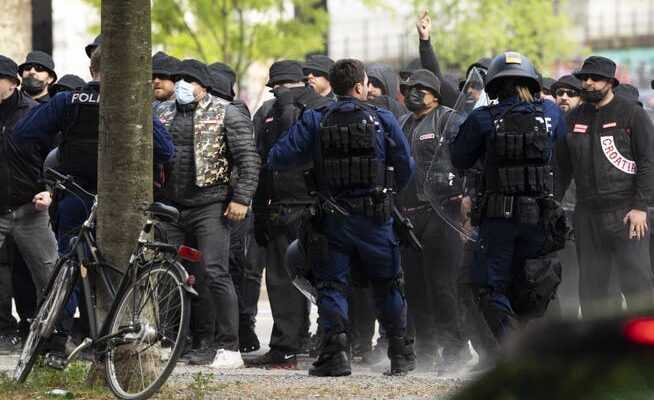The violent excesses of hostile rocker groups worry before a court in Bern. They seem to demonstrate the threat posed by a little-noticed milieu. The demonstratively presented “toxic masculinity” is no coincidence.
Police officers stand between the members of the Hells Angels and the Bandidos in Bern.
Such scenes are more reminiscent of gang wars in major American cities than of a criminal trial at the regional court on the tranquil Hodlerstrasse in Bern: men in martial leather jackets have traveled from half of Europe to mark their presence. The police tried to keep the hostile groups apart with barriers, but the rockers threw stones at each other. Pepper spray and rubber shot are needed to prevent escalation. If the term “toxic masculinity” ever hits the mark, then when looking at the pictures of Bern.
They seem to document the threat posed by a milieu that has recently grown in Switzerland. In a single trial, 22 suspects are on trial, some of whom are accused of serious crimes up to and including attempted murder. Three years ago there were excesses of violence with knives and firearms in Belp because the Hells Angels wanted to defend a territory they were supposedly entitled to against the newly emerged Bandidos.
Banned in German federal states
Enemy rocker groups have repeatedly fought in Switzerland. Three years ago, members of the Hells Angels ended up in court in Aargau after targeting supporters of a rival club. According to the Federal Office of Police (Fedpol), there is “serious potential for conflict” in the scene of rocker and rocker-like groups. Abroad, the threat is even more serious. Rocker clubs are banned in several German federal states, and this has been the case nationwide for the Bandidos since 2021. In the Netherlands, the judiciary cracked down on various groups for their involvement in extortion, human trafficking and murder.
A few years ago, Switzerland also tried to fight the Hells Angels at federal level and as part of organized crime. In 2004, at the instigation of the federal prosecutor, the police drove to the headquarters in Zurich’s Langstrasse, confiscated weapons and drugs, and arrested thirteen rockers. But the major raid turned out to be a flop. The federal prosecutor’s office had to drop the charges of organized crime due to lack of evidence. And the penalties that were pronounced years later for the other offenses were soberingly mild. The action is one of the biggest flops of the federal prosecutor.
Excesses are unacceptable
It is now considered exaggerated and unrealistic in Switzerland to want to fight the gangs as criminal organizations. They do show certain parallels to mafia-like associations, for example in terms of hierarchical structure or territorial claims. Significantly, however, no motorcycle rocker has ever been convicted of involvement in a criminal organization in Switzerland. There is little evidence that the milieu is becoming a serious threat to public safety. The requirements for bans on organizations based on foreign models are also significantly stricter in Switzerland, not least as a result of the liberal association law.
As strange as the pictures of Bern may seem, the riots, which took place in public, are also part of a staging intended to mark apparent strength. The excesses are unacceptable and it is good that the police are taking decisive action against them. And yet it would be wrong to panic. The trial at the regional court at Hodlerstrasse 7 in Bern also represents a piece of Swiss normality: Anyone who is violent and criminal is punished – no matter what is going on outside the courthouse.
